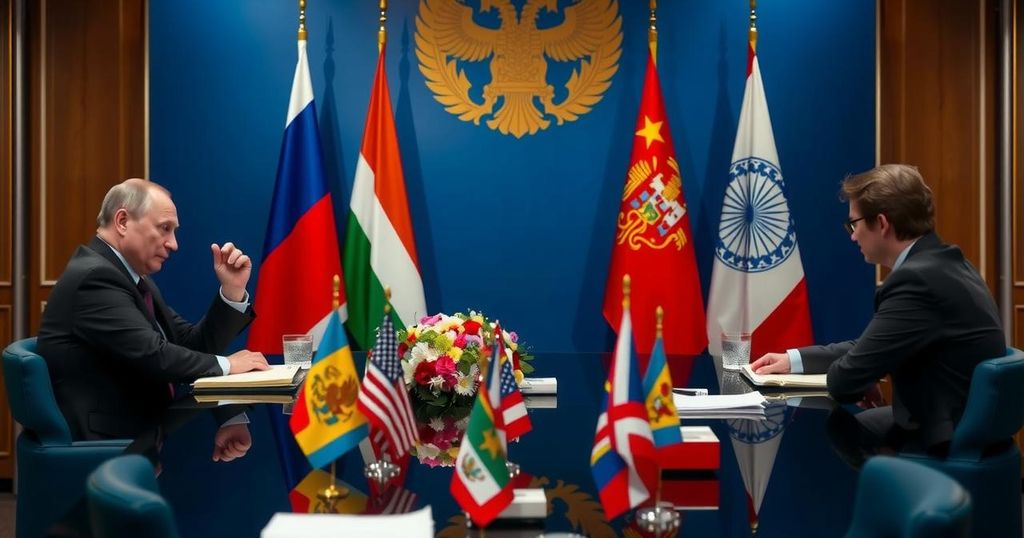At the BRICS summit in Kazan, Russia, President Vladimir Putin sought to expand Russia’s influence, emphasizing cooperation among emerging economies. Chinese President Xi Jinping called for a de-escalation of tensions in Ukraine, underlining BRICS’ role in global security. The summit showcased the bloc’s potential to challenge Western dominance and enhance financial collaboration among its members.
At the recent BRICS summit held in Kazan, Russia, President Vladimir Putin presided over discussions aimed at enhancing Russia’s influence in the international arena. President Xi Jinping of China emphasized during the summit the importance of averting any escalation in the ongoing conflict in Ukraine. The summit attracted leaders from various nations, reinforcing its role as a significant gathering for emerging economies seeking alternatives to Western dominance. The three-day event not only highlighted the necessity for financial collaboration among BRICS nations but also focused on expanding the group, which originally included Brazil, Russia, India, China, and South Africa. Now, the coalition extends to include Iran, Egypt, Ethiopia, the United Arab Emirates, and Saudi Arabia, with additional countries like Turkey, Azerbaijan, and Malaysia expressing interest in membership. In his closing remarks, President Putin lauded BRICS as a pivotal counterbalance to what he described as the ‘perverse methods’ employed by Western powers, including sanctions and economic manipulation. He stated that the West was attempting to suppress the rising influence of the Global South, which in turn fosters new conflicts and exacerbates existing tensions. Addressing the ‘BRICS Plus’ segment, which featured prospective new members, he reiterated Russia’s call for an independent payment system to help mitigate reliance on Western financial structures and enhance trade cooperation. Chinese President Xi Jinping reiterated the significance of BRICS in global security, advocating for a peaceful resolution to the conflict in Ukraine, suggesting that both China and Brazil have proposed a peace plan for the region. However, this proposal has thus far not garnered acceptance from Ukraine. Prime Minister Narendra Modi of India supported the aim of achieving a peaceful settlement without overtly condemning Russia’s actions, illustrating India’s strategic balancing act between Russia and its own geopolitical interests. During the summit, discussions also took place concerning joint security measures and financial strategies to stabilize and reduce tensions among member states. Furthermore, the presence of U.N. Secretary-General Antonio Guterres at the summit emphasized a broader international plea for peace across multiple conflict zones, including Ukraine. The summit was viewed domestically by Russian media as a significant diplomatic triumph, underscoring the collective power of BRICS nations, which together represent approximately half of the global population.
The BRICS bloc comprises five major emerging economies – Brazil, Russia, India, China, and South Africa – plus additional countries seeking membership. It was founded in 2009 as a response to Western economic and political dominance in global affairs. The recent summit in Kazan sought to strengthen economic partnerships among these nations and establish new frameworks to reduce reliance on Western financial systems. Notably, amidst the ongoing conflict in Ukraine, the summit also served as a platform for Russia to display its diplomatic resilience against Western attempts to isolate it.
The BRICS summit in Kazan marked a strategic gathering of emerging economies, where leaders sought to amplify their collective voice against Western hegemony. President Putin’s remarks underscored that the bloc is positioning itself as a counterweight to Western sanctions and economic policies. The event showcased a commitment to enhanced financial cooperation and a potential expansion of the bloc, positioning BRICS as a formidable entity in global affairs. Indications of support for a peaceful resolution to conflicts like that in Ukraine further highlight the bloc’s intent to champion a multipolar world order where developing economies can exert greater influence.
Original Source: apnews.com






